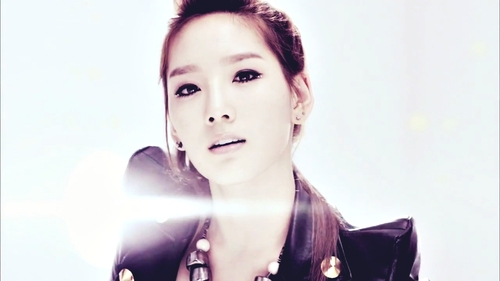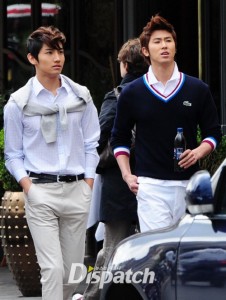 When it comes to “leaders” in K-pop, it seems like about 80% don’t really do anything important that fans actually care about (they do have important technical obligations though.) Usually people envision a “leader” as the person who is the forthright director and organizer of a group who stands at the podium or sits at the foot of the table, yet it’s not quite like that in K-pop. There isn’t always a particular quality that makes you go, “Ah, so that’s why he’s the leader,” nor do you always associate “powerful” with the leader position.
When it comes to “leaders” in K-pop, it seems like about 80% don’t really do anything important that fans actually care about (they do have important technical obligations though.) Usually people envision a “leader” as the person who is the forthright director and organizer of a group who stands at the podium or sits at the foot of the table, yet it’s not quite like that in K-pop. There isn’t always a particular quality that makes you go, “Ah, so that’s why he’s the leader,” nor do you always associate “powerful” with the leader position.
Most of the time, to be in accordance with the social hierarchy of Korea, the oldest member gets the title. Since the choice of leader is pretty arbitrary, it’s not all that uncommon for the general public to have no idea who the leader is of a group without looking it up. (I confess that I don’t know who B2ST’s leader off the top of my head, even though I like their music.) Groups wherein the leader plays a significant role in the group as leader are few and far between. But an unimportant leader and an important group are not mutually exclusive. SHINee, for example, doesn’t really have an all important leader, despite having Onew there. Instead, Jonghyun tends to do half the talking, and as we quickly found out, is an important asset to SHINee’s image (as are all the SHINee members.) Onew is far from irrelevant, but he’s not exactly leader material either.
 Another example would be one from of the biggest groups of all time, SNSD. You can say all you want about the “kid leader,” however, SNSD doesn’t really have a true leader. For all intents and purposes it is Taeyeon, but Taeyeon doesn’t really hold any leverage on the group, nor has she taken the leader position very seriously. SNSD are just fine, even with the apathetic leader they have. Super Junior is very much the same way, as Leeteuk, though considered to be an important leader-like member amongst the members themselves, doesn’t carry much weight in the destiny of the group. The similarities between SNSD and Super Junior play a large role in why the leaders are treated similarily: both are large groups, both groups heavily focus on individual members activities outside of music, there is no major popularity rift between one member and the rest of the group, nor is everyone’s popularity about the same, and both groups are defined by overall group identity, not the personalities of the members. Most importantly, both Leeteuk and Taeyeon (and Onew for that matter) obtained their roles by being the eldest.
Another example would be one from of the biggest groups of all time, SNSD. You can say all you want about the “kid leader,” however, SNSD doesn’t really have a true leader. For all intents and purposes it is Taeyeon, but Taeyeon doesn’t really hold any leverage on the group, nor has she taken the leader position very seriously. SNSD are just fine, even with the apathetic leader they have. Super Junior is very much the same way, as Leeteuk, though considered to be an important leader-like member amongst the members themselves, doesn’t carry much weight in the destiny of the group. The similarities between SNSD and Super Junior play a large role in why the leaders are treated similarily: both are large groups, both groups heavily focus on individual members activities outside of music, there is no major popularity rift between one member and the rest of the group, nor is everyone’s popularity about the same, and both groups are defined by overall group identity, not the personalities of the members. Most importantly, both Leeteuk and Taeyeon (and Onew for that matter) obtained their roles by being the eldest.
 In contrast, Big Bang and 2NE1 have leaders that matter and were chosen specifically to take the role. CL defines 2NE1 and is the major spokesperson for 2NE1. She is very forthright and builds the relationships between the members of the group which happens to have a huge age gap that you barely notice. She also is the one to maintain the 2NE1 style. Other members of the group lean on her when it comes to decision making and public presence. GD is very much the same way, with the added impact of writing and composing most of Big Bang’s repertoire. GD also has the power to define Big Bang through the way he composes for the group. GD isn’t so much of a spokesperson as CL is for 2NE1, but that’s because Big Bang tends to be as fractured as it is together. Members place their individual activities and their group ones at almost equal importance; therefore, GD has no real need to unify the group very much or serve as a major spokesperson because, really, anyone in Big Bang could do that.
In contrast, Big Bang and 2NE1 have leaders that matter and were chosen specifically to take the role. CL defines 2NE1 and is the major spokesperson for 2NE1. She is very forthright and builds the relationships between the members of the group which happens to have a huge age gap that you barely notice. She also is the one to maintain the 2NE1 style. Other members of the group lean on her when it comes to decision making and public presence. GD is very much the same way, with the added impact of writing and composing most of Big Bang’s repertoire. GD also has the power to define Big Bang through the way he composes for the group. GD isn’t so much of a spokesperson as CL is for 2NE1, but that’s because Big Bang tends to be as fractured as it is together. Members place their individual activities and their group ones at almost equal importance; therefore, GD has no real need to unify the group very much or serve as a major spokesperson because, really, anyone in Big Bang could do that.
There are the leaders of groups that basically become the whole group, such as Zico and Bang Yong-guk who basically have taken over everything to the point that you could talk about those two and be referring to the rest of the group at the same time. However, this doesn’t mean that group members are irrelevant—no, it’s actually far from that. What it does mean however, is that the leader is the high-profile member of the group, unlike in the aforementioned Big Bang and 2NE1 where the members have gained the same high status as their leader.
 Some leaders even have groups made for their sake or with great input from those leaders, as in the case of BEG (JeA) and After School (Kahi, though she has left the group.) For JeA, BEG is basically her brainchild. For Kahi, it’s not quite like that, but After School is very much “Kahi’s group” even though it still goes strong without her.
Some leaders even have groups made for their sake or with great input from those leaders, as in the case of BEG (JeA) and After School (Kahi, though she has left the group.) For JeA, BEG is basically her brainchild. For Kahi, it’s not quite like that, but After School is very much “Kahi’s group” even though it still goes strong without her.
You also have your “rotating leaders,” which is a concept I don’t quite grasp because it doesn’t give anyone enough time to establish a group dynamic as leader before you have to move onto the next one. It’s only T-ara that actually does this, but I guess the benefit to having rotating leaders is to give every member a chance at completing all the technical “leader duties.”
Victoria of f(x) is one of those “mother” types who doesn’t really serve as the all powerful leader. She’s more the nurturing kind of leader, that takes care of the group behind the scenes rather than in front of the camera. She plays an important role in the group member’s lives, but I really don’t think that the first thing that comes to mind when fans think of Victoria is “leader,” they usually think “super-flexible girl,” “Chinese,” and “Vic-umma.”
 Finally you have the kind of leader that makes being the leader everything they are. If you haven’t guessed who that person is already, that’s okay, but for the half-a-million Cassies that seem to be on this site, I’d think that they would know immediately: TVXQ’s Yunho. Yunho is one of those leader types in K-pop that completely baffles me, because he takes being a leader very, very, seriously, almost too seriously. Even as TVXQ has dwindled down to two people, he still introduces himself as “The Leader of TVXQ” before anything else. (It’s kind of hilarious actually, because what kind of leader leads over one person?)
Finally you have the kind of leader that makes being the leader everything they are. If you haven’t guessed who that person is already, that’s okay, but for the half-a-million Cassies that seem to be on this site, I’d think that they would know immediately: TVXQ’s Yunho. Yunho is one of those leader types in K-pop that completely baffles me, because he takes being a leader very, very, seriously, almost too seriously. Even as TVXQ has dwindled down to two people, he still introduces himself as “The Leader of TVXQ” before anything else. (It’s kind of hilarious actually, because what kind of leader leads over one person?)
Most would think that “a leader” kind of useless in a two person group. However, Yunho is unique, because unlike out of almost everyone I’ve mentioned so far, “Leader” is the most important thing that makes Yunho relevant. Before, “rapper,” “dancer,” “manly member” and “bass vocalist,” Yunho is known as “The Leader.” Since the moment Jaejoong (who was first offered the role because he was a few days older than Yunho, and now is somewhat of a “defacto” leader of JYJ) basically handed him the title over ten years ago, Yunho has run away with the position and made it his own. Though all members are popular and very capable, Yunho is an important spokesperson and guardian of the group. Above all, Yunho defines what TVXQ is to the general public both as five, and as two. Yes, I know what you’re all thinking right now, “Didn’t he fail as leader since the old TVXQ broke up?” I personally don’t think that’s a pertinent issue here. Yunho knows exactly how to be a leader in K-pop in every sense of the word, and I wouldn’t be surprised if that “failure” haunts him to this day, given his personality. The important thing is that his own image is entirely dependent on his leadership duties.
 Despite labeling Yunho as the “quintessential leader,” other the leaders in K-pop that I have mentioned (and ones I’ve left out) are all extremely successful in their own way. Leaders have to modify their presence based on group dynamic and group image, and if they don’t, well, things won’t be pretty. We can’t place a “Yunho” kind of leader in Big Bang, and expect good results. We can neither do the reverse and put GD in TVXQ. I doubt that we could switch CL and GD even with all the similarities between the two. All leaders have their positives and negatives, but every group has the leader that’s probably best suited for it.
Despite labeling Yunho as the “quintessential leader,” other the leaders in K-pop that I have mentioned (and ones I’ve left out) are all extremely successful in their own way. Leaders have to modify their presence based on group dynamic and group image, and if they don’t, well, things won’t be pretty. We can’t place a “Yunho” kind of leader in Big Bang, and expect good results. We can neither do the reverse and put GD in TVXQ. I doubt that we could switch CL and GD even with all the similarities between the two. All leaders have their positives and negatives, but every group has the leader that’s probably best suited for it.
So Seoulmates, do you find leaders to be important in K-pop? Are there leaders that are actually terrible? Let us know in the comments!
(Images Via: YG Entertainment, SM Entertainment, Pledis Entertainment, Dispatch)

